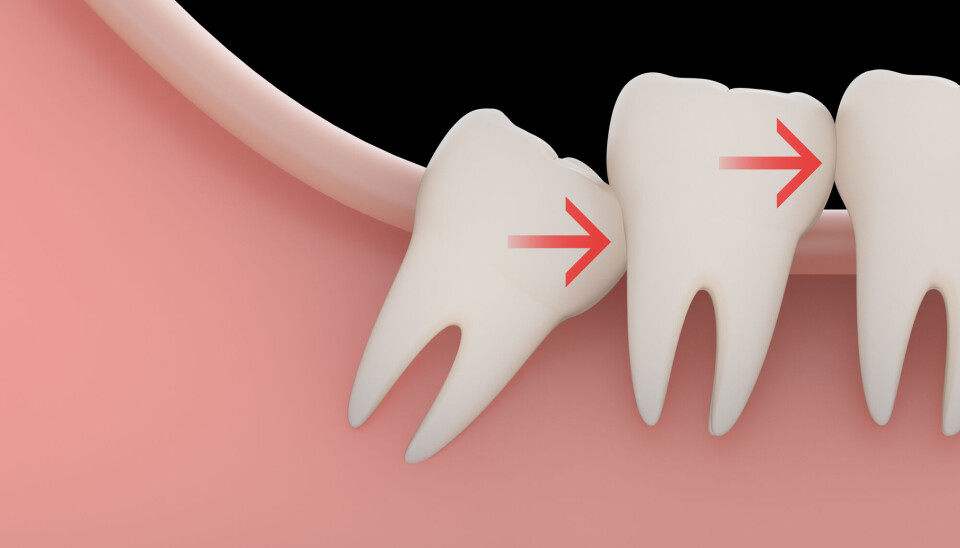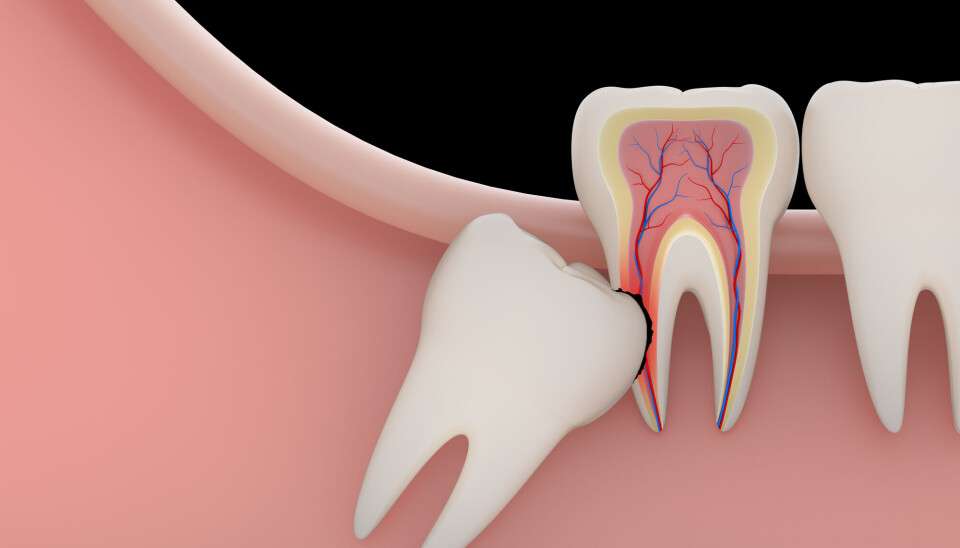
Why do we have wisdom teeth?
Something happened to our jawbones after the agricultural revolution 10 000 years ago.
They come out crooked, they don't come out at all – or they’re difficult to brush because they’re at a strange angle.
Wisdom teeth cause a lot of headaches. “Why do we even have them?” wonders a reader.
So we asked Hauk Øyri, a researcher in the Faculty of Dentistry at the University of Oslo and a specialist in oral surgery and oral medicine.
“Evolutionarily, this is the rearmost tooth in our mouth,” says Øyri.
By that he means that the wisdom tooth is a completely normal molar that has functioned normally for most people in the past. Then gradually something happened.

Jaws became smaller
A few thousand years ago, things were different.
"People had a slightly larger jaw, and thus more space for all our teeth. Human faces have gradually developed so that the jawbone has shrunk somewhat,” says Øyri.
And this is where the problem lies. A narrower jaw means that the back teeth have less wiggle room.
“The wisdom teeth get a little crowded,” Øyri says. They might come out crooked, and many don't erupt at all.
The agricultural revolution
Our jaws have changed as our diet changed.
Zoologist Torfinn Ørmen explained in a sciencenorway.no article earlier this year that hunters and gatherers were fundamentally healthy because they ate everything between heaven and earth.
A lot of what they consumed offered some chewing resistance. However, that changed about 10 000 years ago with the onset of the agricultural revolution.
People began to eat completely different types of food. Less tough foods led to smaller jaws over the ensuing millennia.
But it all depends on your genetics. Some people are predisposed to wisdom teeth. Others aren’t.
One in ten Scandinavians doesn’t have wisdom teeth
In Scandinavia, the situation is roughly the same as in Germany, Great Britain and Canada. About one in ten Scandinavians is missing one or more wisdom teeth.
Figures in Asia show that up to 40 per cent of the population are not predisposed to having wisdom teeth, says Øyri.
“Most of us get wisdom teeth, but not everyone has problems with them and needs to have them removed.”
However, how many wisdom teeth that are removed varies from country to country.
“Clinical experiences play a role, and so do traditions,” says Øyri.


Two thirds may need to remove a crooked wisdom tooth
Øyri refers to an American study that followed a large number of people over a long period. It showed that the need to extract wisdom teeth increased over the years.
“If you have a wisdom tooth that is slightly askew, the study suggests that up to two thirds of people with this condition will need to have it removed during their lifetime,” says Øyri.
Too few studies to date have tracked enough people over a long enough time to establish anything, according to the researcher.
Problems often discovered in 20s
Wisdom teeth usually erupt when a person is between 17 and 22 years old. People most commonly discover any problems during their 20s. Wisdom teeth that only grow halfway out are often difficult to keep clean.
The gums can become inflamed around teeth that have not grown out fully. They are more prone to cavities, and can be positioned in such a way that the tooth next to it becomes difficult to brush.
Removing a wisdom tooth also carries a certain risk of pain and inflammation afterwards.
The body is less impacted if the tooth is removed when a person is young, says Øyri, whose own research shows evidence of this.
Øyri’s research is based on Norwegian studies that have shown that the risk of complications is lower in people aged 25 and under, when it is easier to avoid pain and inflammation afterwards.
Not automatically removed
Øyri says that no new figures are available for how many wisdom teeth are removed each year. A Norwegian researcher came up with the figure of 75 000 per year in the mid-1990s.
“I think that number is lower now. The guidelines have been tightened,” says Øyri.
Now there has to be a real risk of trouble for wisdom teeth to be removed.
The research is still not clear on whether preemptive removal is worthwhile or not, says Øyri.
“Preventive removal may be smart, but some research shows that we don't really know. The balance between cost and benefit is debatable,” he says.

British more restrictive starting in 2000
However, some research has shown that avoiding preemptive wisdom teeth removal can lead to a build-up of wisdom teeth that will need to be extracted down the road.
The British implemented more restrictive guidelines for the removal of wisdom teeth starting in 2000. The number of wisdom teeth removed decreased significantly.
In 2012, Tara Renton, a professor at King's College London Dental Institute, and her colleagues published an article in the scientific Journal of Oral and Maxillofacial Surgery.
The article investigated how the new guidelines affected wisdom tooth health.
Bad wisdom teeth accumulated in England
Tooth decay and infections in the wisdom teeth and damage to the surrounding teeth took a few years to increase, but then the increase was significant. The study showed that dentists had to extract more teeth than they had removed preventively to begin with.
Removal happened for other reasons as well, and the average age had also risen, increasing the risk of post-operative complications.
“Experience now shows that if you stop removing wisdom teeth completely as a preventive measure, you’ll suffer setbacks later,” says Øyri.
“That’s why it maybe isn’t completely crazy to take care of things preemptively if you can argue that the tooth is very likely to be a problem in the future,” he says.
More people had room for wisdom teeth a few decades ago
It may be that people had a little less trouble with wisdom teeth a few decades ago. However, that is not due to evolution, but paradoxically enough has to do with improved dental health.
Øyri points out that it used to be far more common for people to have molars removed at primary school age due to tooth decay.
“If you have to pull the six-year molar, you end up with a gap. This meant that, for example, when you turned 18 and the wisdom tooth had not yet fully erupted, there was suddenly more room for it.”
We have improved our dental health, and now we pull fewer teeth.
“Perhaps that’s one of the reasons why more people have problems with their wisdom teeth? Wisdom teeth pose a problem for quite a few people, and it’s of course understandable that they find it annoying to go through an operation to remove a tooth that seems redundant,” says Øyri.
———
Read the Norwegian version of this article at forskning.no
------
































